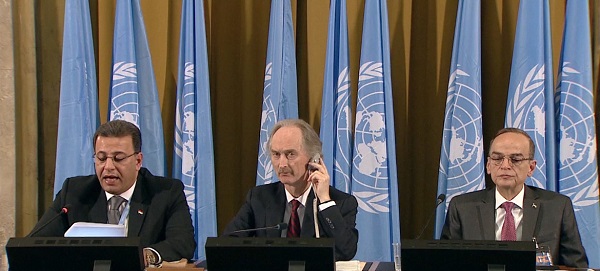Alwaght- Syrian Constitutional Committee held its third meeting on Monday, 9 months after the last meeting in Geneva, Switzerland.
A day after the meeting, Russia, Iran, and Turkey as the leading foreign actors in the Syrian conflict, issued a 10 point statement, making clear their position on the latest conference of the SCC.
What does the statement of the trio, as the initiators of the Astana peace talks between the Syrian government and opposition, imply?
The statement appears to signal that two actors are losers in this round of talks: Syrian Kurds and Israeli Regime.
Syrian Kurds, who dream of the US support
In the first place, the most important signal this round of constitutional talks in Geneva can send out is that the Syrian Kurds are the losers of this process. Since 2014, they engaged in a kind of strategic partnership with the US and played as Washington’s infantry in the Syrian developments on the ground. They initially made gains against ISIS in the north and southeast. However, their gains were undone in 2018 as the Turkish military and the aligned militias launched three operations aimed at cutting off the Kurds from regions in the north close to the Turkish border. The Turkish campaign imposed on the Kurds back-to-back defeats. The attention-grabbing point is that the Americans more than once abandoned the Kurds and left them at the Turk’s mercy. This “historic” betrayal was repeated a couple of times.
In 2019 and during the Turkish campaign in the Eastern Euphrates region, the Kurds dramatically reviewed their cooperation with the Americans. At the time, they raised their understanding of the Syrian battleground realities and moved close to the central government. The closeness was so well that regions under the control of the frustrated Syrian Democratic Forces (SDF) were transferred to the government forces.
But this did not last long. Since last year, the Kurds once again were caught in an American program to fuel divisions among the Syrian internal ranks. Washington on one side signed contracts with them to help them produce sell oil from eastern Syria oilfields and on the other hand encouraged them to separate way from Damascus and walk towards a mirage of autonomy in the north and other regions held by their militias.
But the trio’s statement comes clean on the need to protect Syrian sovereignty, unity, and territorial integrity. Moscow, Tehran, and Ankara reiterated their resolve to battle terrorism in all its forms and stand in the face of separatist agenda that undermines Syria’s sovereignty and territorial integrity and threatens the national security of neighboring countries.
An important point of the statement that directly addresses the Kurds is the opposition to illegal seizure and transfer of oil and its revenues that “belong to the Syrian Arab Republic.” The three countries blasted the partnership between an American company and an illegitimate entity that serves the separatist agenda. The statement brazenly sent the message that by continuing their submission to the US the Kurds will be distanced from the Syrian constitution discussions and at the same time their plans find no ground for materialization despite being backed temporarily by the Americans.
Israeli regime, which is frustrated with Russian support
Another loser as the tripartite statement shows is the Israeli regime whose strategy to draw the Russian support or at least silence concerning Tel Aviv’s air aggression against Syria is failing. The representatives of the three countries condemned the Israeli attacks on Syria as violation of international laws and UN humanitarian values. They warned that the air raids undermine the sovereignty of Syria and neighboring countries, as they simultaneously put at risk the regional peace and stability. This unprecedented harmony of visions among Russia, Iran, and Turkey against Israeli military actions in Syria is viewed by many analysts a fiasco for Tel Aviv leaders. It buries the rumors and suggestions surrounding Moscow-Tel Aviv coordination in the Syrian political and ground equations.



























